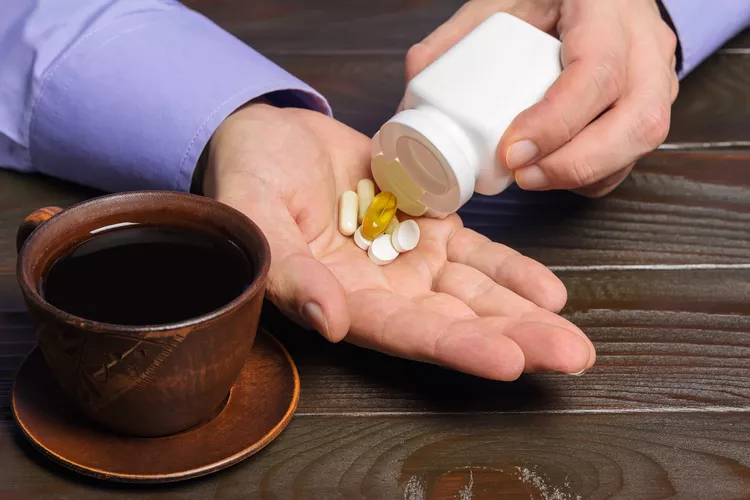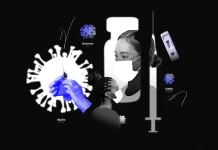
If you’re like the majority of Americans, your day likely kicks off with a hot cup of coffee, often followed by a trip to the bathroom—a common consequence of caffeine consumption.
Research indicates that coffee has the potential to stimulate the stomach, influencing the speed at which food traverses the digestive system.1 However, beyond its impact on digestion, your morning coffee can also interact with the medications you might be taking, influencing the rate at which these drugs are absorbed into your bloodstream.
This implies that consuming coffee simultaneously with your medications could impact their efficacy. In 2020, a team of researchers conducted an extensive review of various medications and their interactions with coffee. Their findings highlighted that coffee “significantly affects the absorption, distribution, metabolism, and excretion of many drugs.”
It’s important to note that not all medications are susceptible to the effects of coffee. Continue reading to discover which medications should not be combined with coffee and what factors to consider.
Cold or Allergy Medication
Cold and allergy medications, commonly utilized by millions of individuals, frequently incorporate central nervous system stimulants such as pseudoephedrine.5 Since coffee is also a stimulant, pairing your allergy medication with coffee may heighten symptoms like restlessness and disrupt sleep.
Certain allergy medications, such as fexofenadine, should be avoided in conjunction with coffee, as it has the potential to overstimulate the central nervous system, intensifying restlessness symptoms.6 It is advisable to consult your healthcare provider for guidance on combining coffee with cold or allergy medicine.
Thyroid Medicine
If you’re dealing with hypothyroidism, a condition where your thyroid gland, resembling a butterfly-shaped structure at the front of your neck, fails to produce an adequate amount of thyroid hormone, various symptoms such as weight gain, dry skin, joint pain, hair loss, and irregular menstrual periods may manifest.
In the management of this condition, many individuals are prescribed levothyroxine or other thyroid medications to restore hormonal balance. Research indicates that consuming coffee concurrently with your thyroid medication can diminish the absorption of the medicine, potentially diminishing its effectiveness. This isn’t a minor impact; reports from patient cases suggest that coffee may reduce the absorption of thyroid medicine by more than half.
Alzheimer’s Medicine
Alzheimer’s disease ranks as the seventh leading cause of death in the United States, predominantly impacting individuals aged 65 and older. This neurodegenerative disorder hampers cognitive function, leading to challenges in thinking, remembering, and performing daily activities. Numerous Americans grapple with Alzheimer’s disease and often rely on medications such as donepezil, rivastigmine, and galantamine for its management.
Caffeine, present in coffee, can influence Alzheimer’s medication. The caffeine’s impact on the blood-brain barrier can tighten it, potentially diminishing the drug’s passage to the brain. Alzheimer’s medications function by safeguarding the neurotransmitter acetylcholine, and excessive coffee consumption has demonstrated the potential to compromise this protective effect.
Diabetes Medication
Combining your coffee with sugar or milk may result in a surge in blood sugar levels, impacting the effectiveness of your diabetes medication. Moreover, research indicates that caffeine could exacerbate symptoms for individuals with diabetes.
A study published by the American Diabetes Association suggests that the consumption of caffeinated beverages, such as coffee, may elevate insulin and blood sugar levels. While the study was limited in size, prompting the need for more research, the researchers cautioned that excessive caffeine intake could pose challenges in blood sugar management and potentially heighten the risk of diabetes-related complications.
In the United States and other Western nations, diabetes and prediabetes are prevalent health issues. The Centers for Disease Control and Prevention (CDC) reports that over 37 million Americans have diabetes, with nearly 100 million having prediabetes. Given the high prevalence, it’s common for millions of people to rely on diabetes medications as part of their daily routine.
Asthma Medication
Asthma, a chronic condition affecting the lungs, involves inflammation and irritation of the airways, leading to symptoms such as difficulty breathing, coughing, wheezing, and chest tightness. Millions of Americans, encompassing both adults and children, grapple with asthma and often rely on medications for its management.
During asthma exacerbations, many individuals turn to bronchodilators like aminophylline or theophylline. These medications function by relaxing the airways, facilitating easier breathing, but they are accompanied by potential side effects such as headaches, restlessness, stomach pain, and irritability. The consumption of coffee or other beverages high in caffeine can elevate the risk of experiencing these side effects. Furthermore, coffee may diminish the absorption and effectiveness of the medication within the body.
Osteoporosis Medication
Osteoporosis, a condition characterized by thin and fragile bones, significantly heightens the risk of bone fractures. This widespread ailment impacts millions of individuals, with women—particularly those postmenopausal—being most susceptible.
To combat osteoporosis, medications like risedronate or ibandronate are commonly prescribed. However, taking these drugs concurrently with coffee is discouraged, as it can diminish their effectiveness. Optimal absorption of these medications is achieved when taken on an empty stomach, preferably before consuming any food or beverages, with only plain water used to swallow the pill. Drinking coffee alongside these medications can curtail their efficacy by over half.
Antidepressants
Antidepressant medications have become a prevalent aspect of daily life, with one in 10 teens and adults relying on them, according to the CDC. They are particularly widespread among adults in their twenties and thirties, addressing depression, a mood disorder impacting both emotions and functionality.
Coffee consumption can influence the way your body processes antidepressant medications. Specific drugs such as fluvoxamine, amitriptyline, escitalopram, and imipramine may undergo altered metabolism when taken simultaneously with coffee, particularly in substantial amounts. The absorption of these medications can be diminished by coffee, potentially reducing their effectiveness.
Of note, studies highlight that fluvoxamine, in particular, can intensify the typical side effects of caffeine, leading to symptoms like insomnia and heart palpitations. It is advisable to separate the intake of medication from coffee consumption to optimize the therapeutic effects.
Blood Pressure Medicine
Hypertension, or high blood pressure, affects tens of millions of Americans, posing an increased risk of heart disease and stroke. Given its often asymptomatic nature, effective management is crucial.
Individuals with hypertension frequently rely on blood pressure medications, such as verapamil or propranolol, which function by reducing heart rate, thereby easing the heart’s workload in pumping blood to all body cells.
However, consuming coffee concurrently with blood pressure medications like felodipine may hinder optimal drug absorption, potentially diminishing its effectiveness. Consult with your healthcare provider to determine the best timing for your medication and your morning coffee.
Antipsychotic Medicine
Antipsychotic medications play a crucial role in managing conditions such as schizophrenia, mania, major depressive disorder, and various mental health issues, with nearly four million Americans relying on them annually. These medications exert their effects by either inhibiting specific neurotransmitters or blocking receptors in the brain.
Psychosis-treating medications encompass phenothiazine, clozapine, haloperidol, and olanzapine. Consuming coffee alongside these medications may lead to reduced absorption, impacting their effectiveness. Research indicates that coffee can alter the metabolism or breakdown of many of these medications in the body. To maximize the therapeutic benefits, it is advisable to take these medications with water rather than coffee.
Melatonin
Melatonin, a natural hormone produced by the body, plays a crucial role in inducing sleepiness as evening approaches, responding to the decreasing sunlight that signals to the brain it’s time to rest. In supplement form, available over-the-counter (OTC), melatonin is commonly used to aid sleep.
In contrast, coffee acts as a stimulant, promoting alertness and wakefulness. The caffeine in coffee opposes the function of melatonin, making it challenging to fall asleep. Concurrently consuming coffee with melatonin may interfere with the hormone’s production, potentially diminishing its effectiveness, as these contrasting substances might counteract each other.
When to Consult a Healthcare Professional
If you are prescribed any of these medications, particularly if they are to be taken in the morning, consider postponing your first cup of coffee.
For individuals taking multiple medications, it’s advisable to discuss with your healthcare provider the optimal way to coordinate your medication schedule with your coffee consumption. If you encounter any undesirable side effects such as restlessness, jitteriness, or insomnia, consult your healthcare provider for guidance on finding a solution.



